Table of Contents


Want to Boost Rankings?
Get a proposal along with expert advice and insights on the right SEO strategy to grow your business!
Get StartedMarketing has officially entered the top tier of professions most exposed to generative AI (GenAI). According to Indeed’s latest AI at Work report, nearly 69% of marketing job skills are positioned for transformation by GenAI.
It places the profession fourth on the list after software development, data and analytics, and accounting.
That number made everyone pause. Almost seven out of ten skills? That is not a small shift. So the real question becomes: are marketers staring at a wave of replacement or a wave of reinvention? Let’s see.
- Why Is Marketing So Exposed to Generative AI?
- From Doing the Work to Directing the Work
- Which Marketing Skills Are Most at Risk?
- How Did Indeed Measure Marketing’s AI Exposure?
- What’s Different From Earlier Research?
- The Bigger Employment Picture
- Marketing Compared With Other Professions
- Are All AI Models Equal in Impact?
- What Should Marketers Do Now?
- The Hybrid Marketing Role
Free SEO Audit: Uncover Hidden SEO Opportunities Before Your Competitors Do
Gain early access to a tailored SEO audit that reveals untapped SEO opportunities and gaps in your website.

Why Is Marketing So Exposed to Generative AI?
The Indeed report evaluated nearly 2,900 work skills across U.S. job postings, measuring them against the capabilities of today’s AI systems.
Marketing emerged as one of the most vulnerable because of its heavy reliance on digital, text-based and cognitive tasks.
Unlike nursing or trades that require a physical presence and human touch, much of marketing happens on screens, in documents or through campaigns that AI can already assist with.
This is not about entire jobs disappearing overnight but about workflows reshaping rapidly.
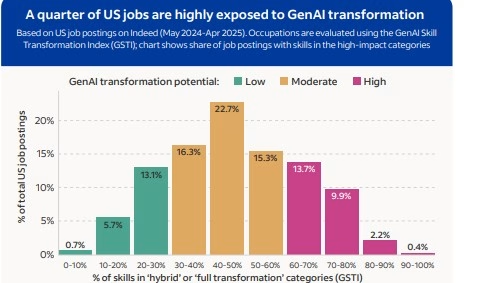
Think of it this way: the very tasks that once kept marketing teams busy for example drafting reports, preparing copy outlines, analyzing data trends are now areas where AI can step in.
That does not mean human creativity is irrelevant; it just means the playing field is shifting.
From Doing the Work to Directing the Work
Indeed’s GenAI Skill Transformation Index does not just talk in generalities; it classifies tasks into four transformation categories: minimal, assisted, hybrid and full transformation.
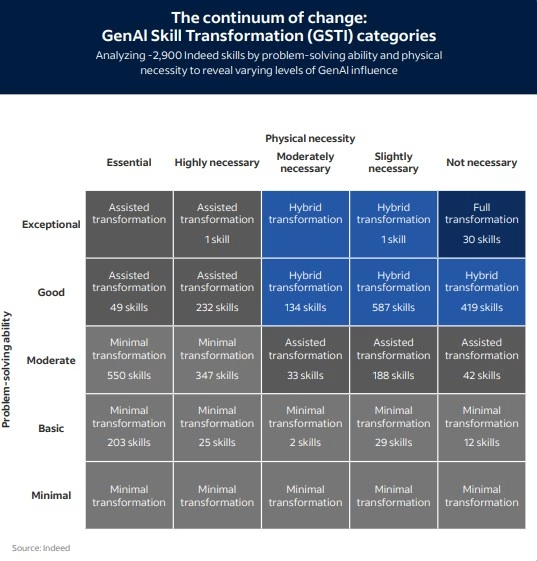
And for marketers like you, most skills sit in the hybrid transformation zone. This essentially means that AI is now capable of executing routine, predictable parts of the job, while humans are still required to oversee the process, validate results and set the strategic direction.
Here is how the official report describes it:
“Human oversight will remain critical when applying these skills, but GenAI can already perform a significant portion of routine work.”
So marketers are not handing over the wheel. They are moving from driving the car themselves to navigating while AI takes on the more mechanical parts of the journey. That shift from doing to directing defines the real transformation underway.
Which Marketing Skills Are Most at Risk?
According to the report, the areas of marketing most exposed to GenAI are:
- Administrative and documentation tasks – scheduling, reporting, drafting.
- Text processing – generating emails, writing first drafts of copy, summarizing insights.
- Information retrieval and analysis – competitive research, trend summaries, keyword analysis.
But the most important? Communication-heavy skills like brand storytelling, persuasion and customer engagement are not vanishing. Instead, they sit in the hybrid zone. AI can help with routine language tasks, but it is marketers who decide how those words actually connect with human audiences.
If you have ever tried asking AI to “write a campaign idea that feels bold but not reckless, playful but not juvenile” then you know what I mean. Machines draft but humans interpret nuance.
How Did Indeed Measure Marketing’s AI Exposure?
The methodology behind the report combined the capabilities of multiple large language models, including OpenAI’s GPT-4.1 and Anthropic’s Claude Sonnet 4. Each
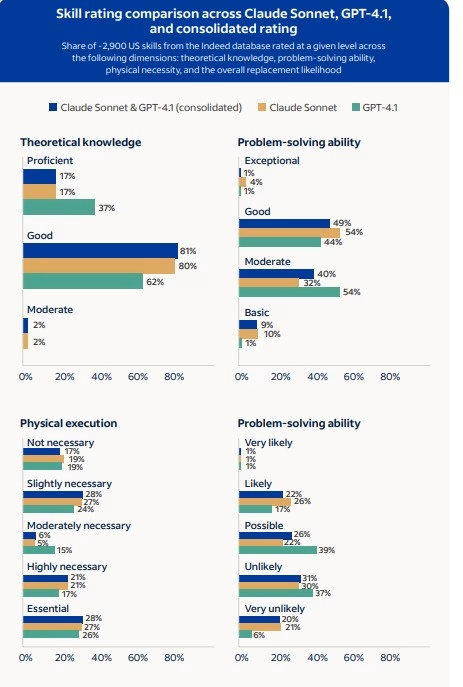
skill was scored based on two dimensions: the level of problem-solving it required and the degree of physical presence it demanded.
Marketing naturally scored high on problem-solving but low on physical necessity. That made it an ideal candidate for GenAI transformation.
When you combine complex but digital-first problem-solving with AI’s growing ability to handle structured input and output then it is no surprise the exposure rating climbed as high as 69%.
What’s Different From Earlier Research?
Interestingly, earlier Indeed Hiring Lab reports found zero skills “very likely” to be fully replaced by GenAI.
This new study shifts that narrative slightly: it identifies 19 skills (0.7% of the 2,900 analyzed) that cross the threshold of being “very likely” replaceable.
But before panic sets in, the authors clarify:
- These are narrow, structured tasks, not entire job roles.
- Full end-to-end automation is still rare and limited.
- The shift is evolutionary, not overnight replacement.
So if you are in marketing, your job is not disappearing tomorrow but transforming gradually, skill by skill.
The Bigger Employment Picture
Looking across the labor market, the report paints a more comprehensive picture of AI’s reach. Around 26% of jobs are highly exposed to transformation, another 54% are moderately exposed and 20% have low exposure.
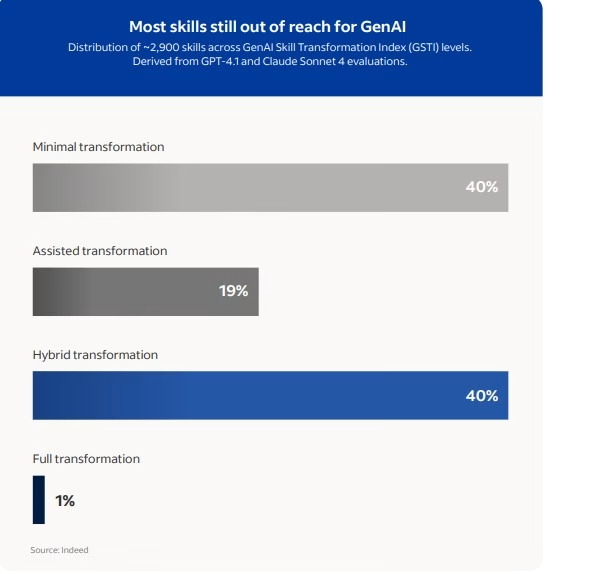
The authors emphasize that these numbers are potential impacts, not guaranteed outcomes.
The actual trajectory depends on how businesses adopt GenAI, how workflows are redesigned to include it, and how workers themselves reskill.
A marketing team with a strong AI adoption strategy will experience this shift differently than one that resists change until the last minute.
Marketing Compared With Other Professions
Here is the ranking of professions by AI exposure:
- Software development – 81% of skills are transformable.
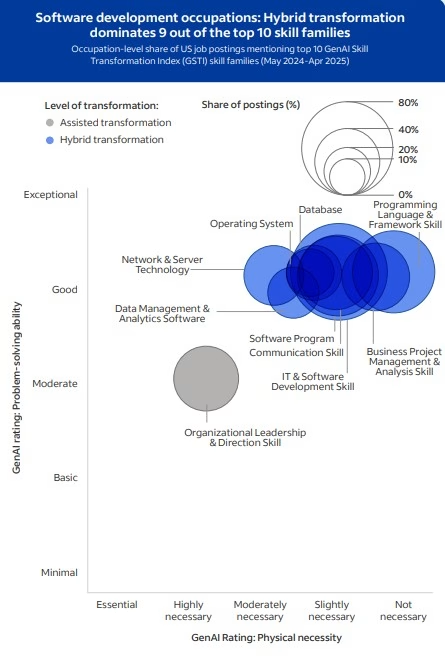
- Data and analytics – 79%.
- Accounting – 74%
- Marketing – 69%.
On the other end of the spectrum? Nursing, at 33%.

That contrast is telling. Fields that rely on logic, structured inputs and digital outputs are the most exposed. Fields that require physical presence, empathy and direct human care are the least.
Are All AI Models Equal in Impact?
One of the report’s more nuanced observations is that not all AI models deliver equally. During testing, performance varied in stability and accuracy between different LLMs. This underlines an important lesson for businesses: adopting AI is not a one-size-fits-all approach.
For marketers, this means experimentation will be key. Some models may excel at drafting marketing copy, while others may perform better at analyzing campaign data.
Choosing the right model for the right task will separate those who see real gains from those left cleaning up messy outputs.
What Should Marketers Do Now?
So, if 69% of marketing skills are exposed, what does a professional actually do with that information? The study’s authors, Annina Hering and Arcenis Rojas, don’t frame this as a doomsday scenario.
Instead, they advise marketers to focus on complementary skills—the ones AI can’t easily replicate:
- Strategic thinking.
- Creative problem-solving.
- Validation and interpretation of AI outputs.
In practice, this means marketers should not only learn how to use AI tools but also how to direct them intelligently, critique their outputs and align them with brand strategy. It is something that Managed SEO services can help integrate into a balanced AI-human workflow
The Hybrid Marketing Role
The timeline for transformation will not be identical for all. Larger companies with the resources to experiment may move faster, while smaller or less digitally advanced organizations may take longer.
But the direction is consistent: marketing roles are evolving from hands-on execution to orchestration and oversight.
Tasks that once consumed hours can now be drafted in minutes, freeing up marketers to spend more time on strategy, storytelling and customer connection.
Those who adapt quickly and reskill for hybrid workflows will not only survive this shift but thrive within it.
About the author
Share this article
Find out WHAT stops Google from ranking your website
We’ll have our SEO specialists analyze your website—and tell you what could be slowing down your organic growth.














